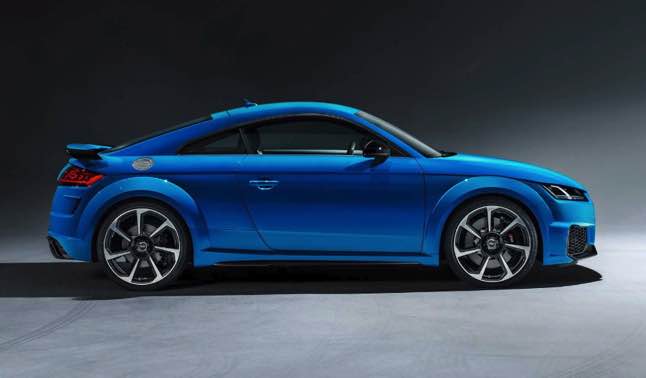The Audi TT isn’t dead yet. Contrary to previous plans to stop the name at the end of the current generation, company CEO Bram Schot now shows that the moniker still exists, according to AutoBlog.nl.
A different path occurs because Schot is bored with people who “complain” about the successor to the TT.
Audi TT is not long for this world. At Audi’s annual general meeting, Bram Schot, chairman of the brand’s board of directors, revealed that the slinky brand sports car would follow Dodo. The new electric car will sit on the TT.
Schot shares little details about upcoming electric vehicles, but he notes that the price range of “emotive” new models will reflect the TT. In the US, TT starts at $ 44,900 for entry-level coupes; However, the sticker can jump past $ 80.00 for the loaded TT RS.
2022 Audi TT News

If the history of the Volkswagen Golf-based TT is something that has passed, then maybe the TT electric replacement vehicle will use the Volkswagen ID.3 MEB platform as a base.
Assuming this is the case, it is safe to guess that a four-ring EV will use a slipperier sheet of metal that has relative added power compared to its VW siblings.
Of course, this is all speculation, and we will know more about the upcoming electric TT replacement Audi in the next few years.
At Audi’s annual meeting, Schot announced that the company intends to replace the TT with a new electric sports car.
Read next: 2022 Audi R8: The New R8 Electric Hypercar, What We Know So Far
Without ever saying it specifically, he seems to indicate that the upcoming model will not carry the name TT.
Schot also suggested that the company wanted the EV to have the same price as the TT that came out, which implies a basic cost of around $ 45,000.
While Audi’s entry-level sports car is set to lose its internal combustion engine, the brand’s flagship sports car may not follow suit.
In his speech, Schot questioned whether the R8 still needed an internal combustion engine and acknowledged that there was still ongoing discussion about the future of mid-engine vehicles.

Although we are saddened to hear that the TT days are numbered, we are happy to see what Audi is doing from a battery-powered replacement.
Assuming this new vehicle carries a torch styling that lights up by the original TT and offers reasonable straight-line performance, we are sure we will find many things to like about Audi’s new entry-level sports car.
Further details about the TT EV remain a complete mystery. It was not clear what the car was like; when the model arrives; or what the vehicle uses.
Using the MEB platform that focuses on Volkswagen Group electric vehicles seems very likely because carmakers are using this foundation for a variety of models to come, starting with the VW ID 3 in mid-2020.
Read next: 2022 Audi Q7: The Next Update Q7 SUV Redesign Looks Better Ever
The current TT generation is reported to last until 2022, so there are still a few years to enjoy the burning-powered version before the EV replaces it.
The Four Rings still keep the small sports car fresh too. The regular model received a facelift in 2018 that included a little more styling and standard equipment.
An update arrived for TT RS (gallery above) in 2019 which gave the hotter model an upgrade of its own design and improved infotainment system software.
2022 Audi TT Electric

Audi’s boss finally approved a proposal for the next generation TT, which would turn into a fully electric crossover, Auto Express said.
There was a fierce battle in the boardroom at the German company about how the next TT should develop.
It has been a debate that has raged since 2014 when the company’s boss, Rupert Stadler (who was later indicted and removed from his position due to his involvement in the VW Dieselgate scandal), proposed the idea that the model could develop into gasoline. Powered five-door Sportback or crossover model.
Since then, Audi has been fast-tracking the electrification plan, and reduced sales for TT today has forced the company to rethink radically for the next model.
Read next: 2022 Audi A6: Everything We Know So Far
So far this year, Audi has only sold 8,756 coupes and 3,362 TT roadster editions globally.
Auto Express understands that the upcoming fourth-generation TT also has a working title, eTTron. This clearly shows Audi’s strategy to fully incorporate the model into its complete EV lineup.
As previewed in our exclusive image, the model will turn into a sporty crossover, with a length of around 4.35 meters.
That will make it more compact than Q3 but, more importantly, it will be much lower.
There will also be dramatic improvements inside, too; TT is currently setting a new standard in the industry with a digital cockpit display and the absence of a center console.

Audi intends to emulate it in the next model, with a cabin that will eliminate switches and calls completely and rely on Tesla-style digital displays for car operation.
What allows Audi to take a radical approach with the next TT is the availability of various special electric vehicle platforms that have been developed for use in all brands in the VW Group.
Audi intends to keep the next TT in line with the current model in terms of price points, so the company has chosen to base eTTron on the group’s entry-level MEB architecture.
The VW ID. 3 will be the first vehicle in the Group to use a new platform and is expected to come to the UK market at a price of around £ 26,000.
ETTron will have a higher price point, estimated at close to £ 45,000, but the MEB architecture will give Audi a way to develop the successor to the TT without being forced to radically change its position in the market.
And just like TT today, the flexibility of the MEB platform will allow Audi to develop several versions with varying levels of performance.
The standard entry-level version of eTTron is rear-wheel drive, powered by a single electric motor that develops up to 200bhp.
At the other end the range will be a model comparable to TT RS today; driven by an electric motor on each axle for four-wheel drive, it will have a total power figure of more than 400bhp.
Three battery sizes, 45kWh, 58kWh, and 78kWh, must provide a range between 200 and 340 miles before needing to be recharged.





